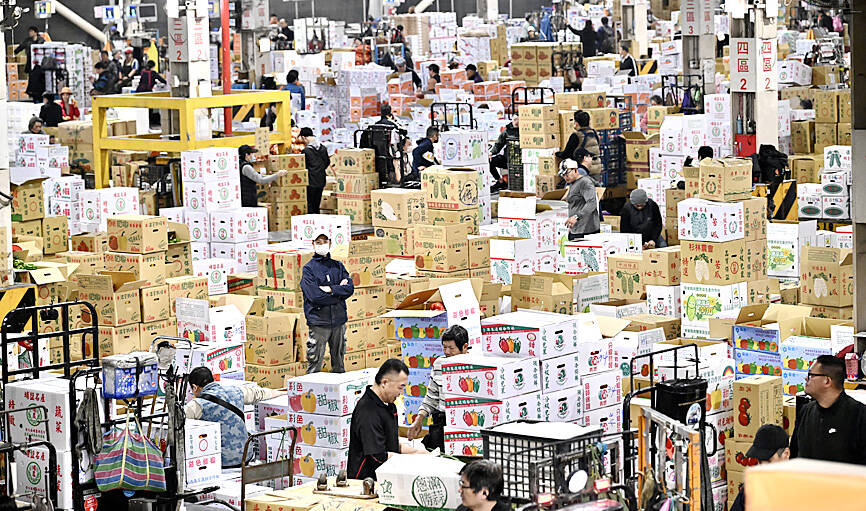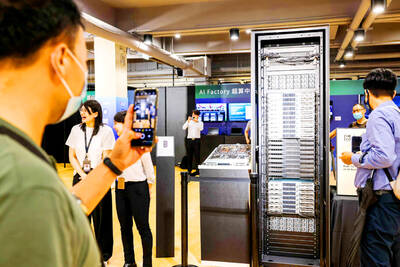Sales generated by Taiwan's wholesale sector increased 8.8 percent year-on-year last year to NT$12.95 trillion (US$396.24 billion), the highest level on record and reversing the previous year’s decline of 6.9 percent, the Ministry of Economic Affairs said on Thursday.
The growth in the sector’s annual sales beat the ministry’s forecast last month of a 7.9 percent to 8.2 percent increase, ministry data showed.
The increase came as sales last month grew 12.9 percent year-on-year to NT$1.17 trillion, rising for the 10th consecutive month and exceeding the ministry’s forecast of an increase of 3.5 to 6.5 percent.

Photo: Peter Lo, Taipei Times
The better-than-expected performance was mainly attributable to the machinery equipment industry, which posted a 25.1 percent year-on-year sales increase last month to NT$545.6 billion, contributing about 44 percent of the sector’s overall revenue last month, the ministry said.
“The machinery equipment industry has benefited from the booming development of emerging technologies, such as artificial intelligence and high-performance computing,” the ministry said in a report, adding that restocking demand ahead of the Lunar New Year holiday also partly contributed to the sales growth.
As the Lunar New Year holiday falls mostly in January this year, versus February last year, the pharmaceutical and cosmetics industry, and the food, beverage and tobacco industry posted higher sales last month due to restocking ahead of the holiday, increasing 13.5 percent and 3.3 percent year-on-year to NT$64.4 billion and NT$133.2 billion respectively, the ministry said.
The chemical materials industry also had a strong performance last month, with sales rising 15.5 percent year-on-year to NT$52.3 billion, the ministry said, citing recovering demand for industrial chemical materials and a low comparison base a year earlier as the main reasons.
On the other hand, the automotive industry posted a 5.5 percent year-on-year sales decline last month to NT$85.8 billion, given less orders from auto distributors and a high comparison base, it said.
For this month, sales for the wholesale sector would post a decline of 3.1 percent to 6.1 percent from a year earlier, as the Lunar New Year holiday reduced the number of working days, the ministry said.
The diffusion index compiled by the ministry — a gauge of firms’ sales expectations for the following month — fell from 50.1 in November to 36.3 last month and was below the threshold of 50, which also suggests a cautious outlook, it added.

LIMITED IMPACT: Investor confidence was likely sustained by its relatively small exposure to the Chinese market, as only less advanced chips are made in Nanjing Taiwan Semiconductor Manufacturing Co (TSMC, 台積電) saw its stock price close steady yesterday in a sign that the loss of the validated end user (VEU) status for its Nanjing, China, fab should have a mild impact on the world’s biggest contract chipmaker financially and technologically. Media reports about the waiver loss sent TSMC down 1.29 percent during the early trading session yesterday, but the stock soon regained strength and ended at NT$1,160, unchanged from Tuesday. Investors’ confidence in TSMC was likely built on its relatively small exposure to the Chinese market, as Chinese customers contributed about 9 percent to TSMC’s revenue last

With this year’s Semicon Taiwan trade show set to kick off on Wednesday, market attention has turned to the mass production of advanced packaging technologies and capacity expansion in Taiwan and the US. With traditional scaling reaching physical limits, heterogeneous integration and packaging technologies have emerged as key solutions. Surging demand for artificial intelligence (AI), high-performance computing (HPC) and high-bandwidth memory (HBM) chips has put technologies such as chip-on-wafer-on-substrate (CoWoS), integrated fan-out (InFO), system on integrated chips (SoIC), 3D IC and fan-out panel-level packaging (FOPLP) at the center of semiconductor innovation, making them a major focus at this year’s trade show, according

DEBUT: The trade show is to feature 17 national pavilions, a new high for the event, including from Canada, Costa Rica, Lithuania, Sweden and Vietnam for the first time The Semicon Taiwan trade show, which opens on Wednesday, is expected to see a new high in the number of exhibitors and visitors from around the world, said its organizer, SEMI, which has described the annual event as the “Olympics of the semiconductor industry.” SEMI, which represents companies in the electronics manufacturing and design supply chain, and touts the annual exhibition as the most influential semiconductor trade show in the world, said more than 1,200 enterprises from 56 countries are to showcase their innovations across more than 4,100 booths, and that the event could attract 100,000 visitors. This year’s event features 17

Hon Hai Precision Industry Co (鴻海精密), which assembles servers for Nvidia Corp, yesterday said that revenue last month rose 10.61 percent year-on-year, driven by strong growth in cloud and networking products amid continued front-loading orders for artificial intelligence (AI) server racks. Consolidated revenue expanded to NT$606.51 billion (US$19.81 billion) last month from NT$548.31 billion a year earlier, marking the highest ever in August, the company said in a statement. On a monthly basis, revenue was down 1.2 percent from NT$613.86 billion. Hon Hai, which is also a major iPhone assembler, added that its electronic components division saw significant revenue growth last month, boosted